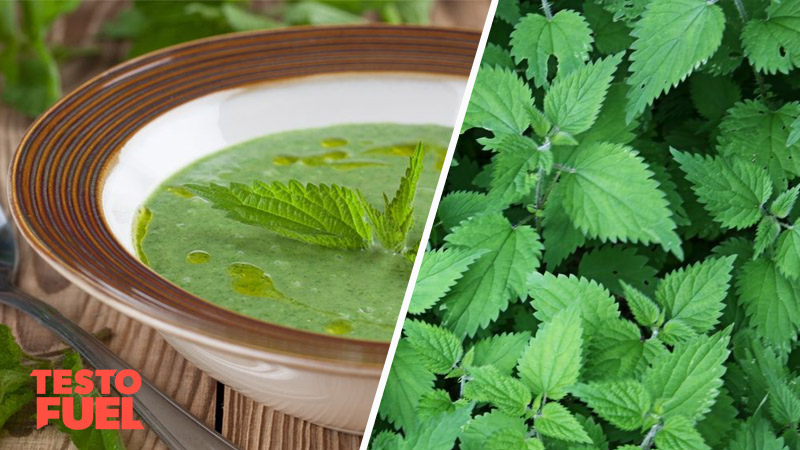TestoFuel Blog : Make Gains & Pack on the Muscle

Stinging nettle is a popular folk remedy used in disorders ranging from asthma to hair loss.
It can be a nasty plant that causes rashes and numbness if you touch it, but it is also packed full of bioactive compounds that promote health and well-being.
Nettle root extract is a common ingredient in testosterone boosters too, with manufacturers promising that it can inhibit hormones that bind to testosterone, making more of it available in your bloodstream.
But with limited studies available, does stinging nettle really boost testosterone levels and are these claims based on any clinical evidence at all?
Let’s find out…
Also known by its botanical name Urtica dioica, stinging nettle root belongs to the Urticaceae family.
It is characterized by a strong, green stem and soft-to-the-touch leaves. It is tall in the summer months and dies down to ground level in colder seasons.
You’ve probably come across stinging nettles as a young child whilst out exploring. They are the plants that give you a painful rash if you come to into contact with them.
Stinging nettles are covered in hair-like cells called trichomes. These needle-like structures can pierce your skin when you touch them, causing chemicals such as serotonin and histamine to enter your bloodstream.
If this happens, the chemicals combine to cause inflammation and pain. They create a feeling of tingling, numbness and burning often referred to as parasthesia.
For this reason, you’ll often hear the plant called burn nettle or burn weed.
Stinging nettles are over 80% water and 5% protein. They contain a number of fatty acids and a range of amino acids including beta-alanine, glutamine, histidine, leucine and phenylalanine.
You’ll also find a number of bioactive nutrients such as sterols, polysaccharide lignans and glycosides in the plant. These can all have an effect on the human body, therefore helping to boost health and wellness [1].
Nettle can be used as a medicinal product that has been used to treat a variety of human illnesses such as metabolic, cardiovascular diseases and cancer.
In traditional folk medicine, nettle has been used to treat everything from gastrointestinal discomfort and diarrhea to asthma [2]. It has been reported to improve the following disorders:
It appears that most of the bioactive compounds are located in the root of the plant. This is also the the part of the plant which has been studied most.
Currently you can also buy nettle leaf supplements that are far less effective then root products and contain less health-boosting nutrients as well.
The first thing you’ll notice with this nutrient is there’s very little clinical research to draw upon.
And the studies that do exist tend to focus more on the prostatic benefits of the supplement rather than its direct effects on testosterone.
That said, stinging nettle is said to potentially have three main testosterone boosting properties:
It has been suggested that sex hormone-binding globulin may be affected by the polysaccharide lignans found in the plant.
SHBG binds to testosterone and stops it from being used by the body. The lower the SHBG levels, the more free T you have available to be taken up the body’s tissues.
And whilst there is a small amount of evidence that nettle may reduce the binding effect on testosterone [3], most studies have used an in vitro design in their studies – basically petri-dish research, not living tissue.
That means that the results are less reliable than in humans or animals.
Stinging nettle may also be an aromatization inhibitor (AI). This means it could potentially slow down the process of testosterone being converted into estrogen.
One of the lignans found in nettel called 9-oxo-10,12-octadecadienoic acid has been found to be a moderate AI in some review manuscripts [4].
Theoretically, if this were to be the case, more testosterone would be free whilst at the same time inhibiting T-reducing estrogen levels. This would be great for overall testosterone health.
There are to date though no human trials to back this up. And if there were any bioactivity it would be minimal due to the small effect of the lignan on aromatase enzymes.
Aromatization occurs because of a prostate enzyme called 5-alpha reductase. It helps to speed up the process making it a catalyst for conversion of T to estrogen.
This protein enzyme not only speeds up the conversion of T to estrogen but also a metabolite called dihydrotestosterone or DHT.
DHT has previously been linked to benign prostate illness as well as male pattern baldness, so any reduction would be beneficial for overall health and well-being.
It would also spare testosterone too meaning there’d be more available in the bloodstream.
Currently though, evidence is limited in this area and inconclusive.
Key Point: Nettle root lignans may help to reduce free T levels by binding to SHBG receptors. There is little evidence though that it helps to inhibit aromatization.
Although there may be some evidence to suggest that nettle root could reduce SHBG binding, there has been very little human studies done on it’s direct effect on testosterone.
One research study gave 558 men 120 mg of nettle supplement each day to treat benign prostatic enlargement. It was found to improve symptoms of enlarged prostate compared to a placebo [5].
Unfortunately though, there were no differences to testosterone levels – even with such as high dose over a long period of time.
Key Point: Stinging nettle might help testosterone if you combined it with more direct nutrients, but on its own it doesn’t appear to be that beneficial.
From the limited number of human studies it is hard to make definite conclusions.
At present though it seems that stinging nettle does not boost testosterone directly but may have a positive effect on mechanisms that indirectly improve hormone levels.
TestoFuel is a premium grade testosterone booster.
Containing only high quality, natural ingredients, it has the power to: